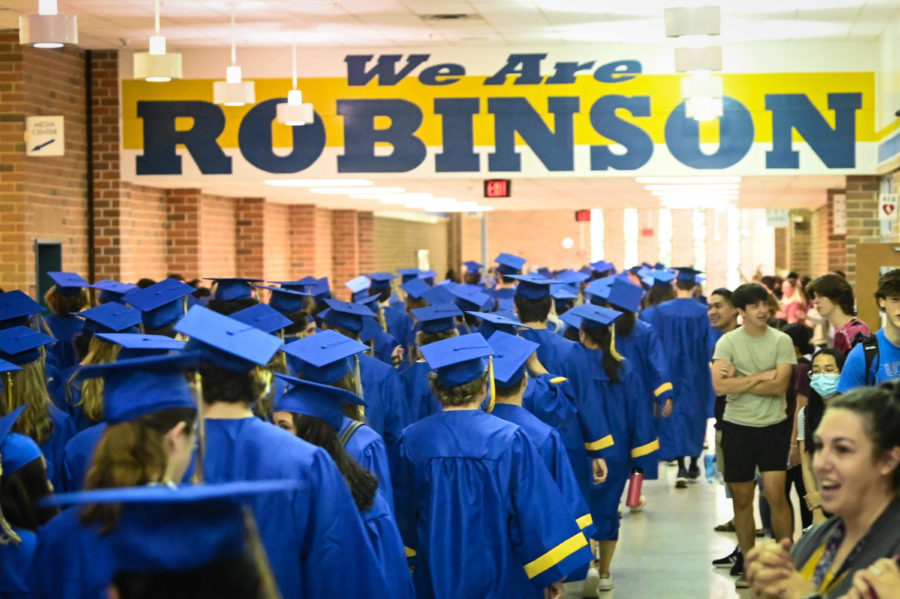The IB Diploma Program: To Pursue or Refrain?
The Class of 2022 walk in the senior parade. The International Baccalaureate Program, also known as the IB Diploma Program, is a rigorous education course that allows students to challenge their abilities and become lifelong learners through college level course work. The program is not for every student, but benefits and drawbacks can be identified for those deciding which path to take.
The International Baccalaureate Program, also known as the IB Diploma Program, is a rigorous education course that allows students to challenge their abilities and become lifelong learners through college level course work. According to the Fairfax County Public Schools (FCPS) website, the IB Diploma Program “aims to develop inquiring, knowledgeable, and caring young people who help to create a better and more peaceful world through intercultural understanding and respect.” Along with an IB course commitment, students strive to hold IB Learner Profile traits, while fulfilling the required extended essay, Theory of Knowledge course, and CAS (creativity, service, and action experience). It is important to recognize that the IB Diploma Program is not for everyone as each student has different strengths, goals, and plans for their future, however, students can be one of the best sources of information for those deciding whether or not to pursue the program.
“I decided to pursue the IB Diploma so that I can have some academic challenge and rigor,” said junior Gelila Solomon. “I felt that the IB Diploma could give me that in terms of the curriculum.” She feels as if the workload along with the diploma is heavy, but previous school years have prepared her to be successful. For Solomon, the academic challenge is a benefit while the time consuming factor is a drawback. “My biggest advice for potential IB Diploma students would be to understand your limits and what IB classes for every subject might suit you better than others [as well as] to time yourself and to manage your time accordingly because your time is valuable.”
Senior Emma Cortez decided not to pursue the IB Diploma Program because she felt it was a big commitment to do the entire program. Instead, she found taking some IB classes was a good balance for her. “I think the [IB] classes are really interesting and it prepares you for college because the classes are challenging,” she said. Cortez also noted that the extended essay, the Theory of Knowledge class taking up an elective spot, and IB exams were some of the drawbacks of the program for her. “I would say definitely take some IB classes if you want to, [but] definitely consider the time commitment it takes to do the full diploma.”
Aside from student feedback and individual reflection, the IB Coordinators, Ms.Vu and Ms.Cho, are a great resource for students who are considering the program. They also serve as a lifeline of support for IB Diploma Candidates along the entire process. When giving insight as to reasons why students choose to pursue the program, Ms.Vu noted that if classes in the IB curriculum sound interesting and engaging to the student and they are able to manage the extra workload along with what they are already doing, then the IB Diploma Program often becomes the right choice for that student. Another reason one may choose to pursue the diploma is because their older sibling did it. This in turn gives the student more of an understanding of the workload and expectations. “Then I also think that there is another group of students that really want to get into a highly selective college and so they think, ‘I really want to set myself apart and doing the IB Diploma will stand out on an application,’” said Ms.Vu.
There are several benefits and drawbacks of the IB Diploma Program which must be evaluated before one chooses to pursue or refrain from the program. Time management is both a benefit and drawback of the program according to Ms.Vu. “I think learning how to manage your time with juggling a lot of different expectations is something that you’re forced to do once you start the Diploma Program and that to me is a benefit because always in life we’re going to have to figure out how to juggle multiple things, no matter what we do,” she said. In addition, “there’ll never be another time where…your time is so spoken for…; trying to figure out how to get in everything you want and being proud of your efforts in everything. So that juggling act is a bit of a drawback because the expectations are so challenging and so high.”
The combination of student and adult advice along with individual reflection can substantially help students in making the right choice regarding their desired academic level of challenge. It is important to note that there are no right or wrong choices when it comes to one’s high school experience as all students have different goals for their future, leading them in different paths.



